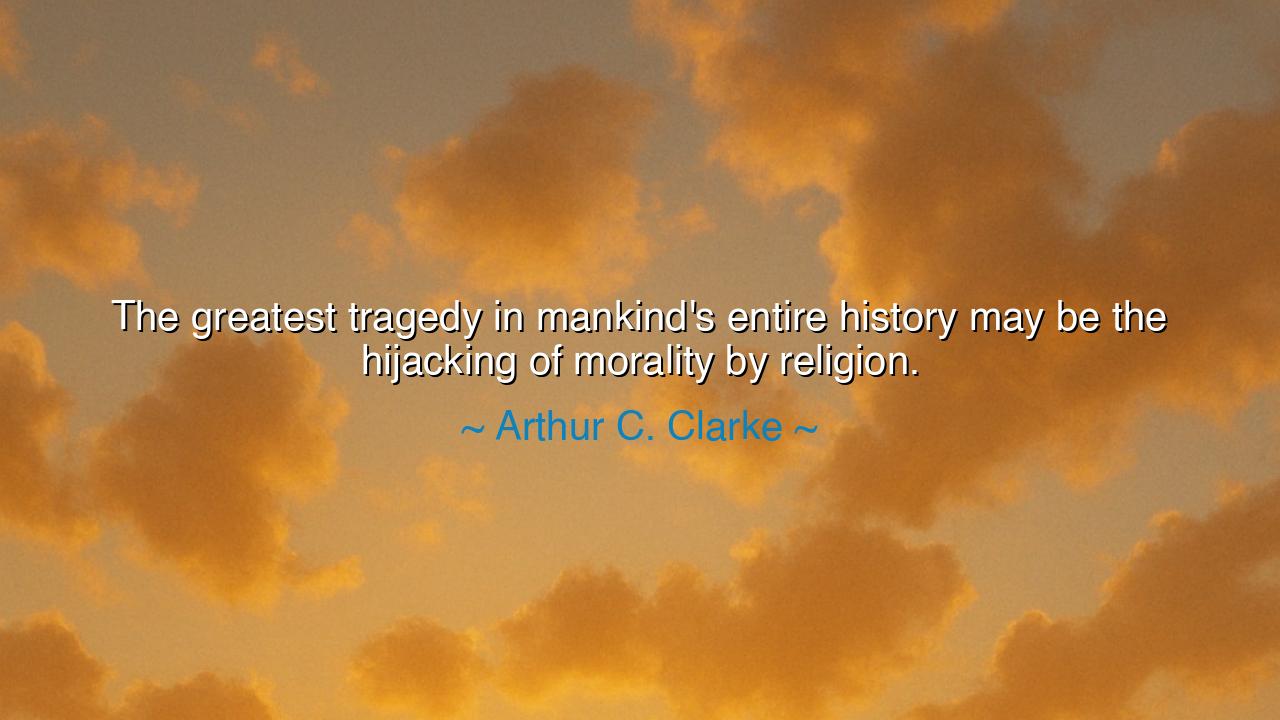
The greatest tragedy in mankind's entire history may be the
The greatest tragedy in mankind's entire history may be the hijacking of morality by religion.






The visionary writer and futurist Arthur C. Clarke, whose imagination reached beyond the stars yet remained deeply concerned with the fate of humanity, once declared: “The greatest tragedy in mankind’s entire history may be the hijacking of morality by religion.” In this bold and sorrowful reflection, Clarke did not condemn faith itself, but the corruption of moral truth when bound in chains by dogma and authority. His words are not the cry of a heretic, but the lament of a humanist — one who believed that the divine spark lies not in creed, but in conscience, and that the greatest evil arises when morality, that inner light of the soul, is claimed and controlled by the institutions of men.
The origin of this quote lies in Clarke’s lifelong meditation on the relationship between science, reason, and spirituality. As one of the great minds of the twentieth century, he witnessed how religion, once a vessel for compassion and unity, had too often been wielded as a sword — dividing nations, justifying cruelty, and silencing inquiry. In his works and essays, Clarke sought a morality that transcended belief — one rooted in empathy, curiosity, and respect for life itself. For him, morality was not the property of priests or prophets, but the natural inheritance of every conscious being. To call its seizure by religion a “hijacking” was to describe the theft of humanity’s most sacred birthright — the power to discern right from wrong without fear or coercion.
To understand Clarke’s meaning, one must remember that before there were temples or scriptures, there were people — parents teaching kindness to their children, communities protecting their weak, hearts stirred by compassion for the suffering of others. Morality is older than religion, born not of commandments written in stone, but of the shared human struggle to live together in peace. Yet, as civilization grew, religion rose to claim divine authorship of this universal wisdom, declaring that goodness could not exist apart from faith, and that to question authority was to question the gods themselves. Thus began a long shadow in history — an age when men killed in the name of love, enslaved in the name of salvation, and silenced truth in the name of holiness.
Consider the Inquisition, that dark tribunal of the medieval world. Under banners of purity and faith, men and women were tortured, burned, and cast out — not because they were wicked, but because they dared to think differently. The moral courage of those who sought truth was condemned as sin, and the machinery of religion turned against the very virtues it once proclaimed: honesty, compassion, and justice. Clarke, looking upon the long tale of such horrors, saw not merely cruelty, but irony — that the institutions which claimed to guard the sacred flame of morality had often extinguished it in their zeal. He mourned that in binding morality to religion, humanity had forgotten that to be moral is to be human, not merely obedient.
Yet Clarke’s insight is not one of despair, but of awakening. He reminds us that morality, once freed from the chains of dogma, becomes a living force again — flexible, universal, and compassionate. True morality, he suggests, needs no promise of heaven nor threat of hell to exist. It is found in the quiet act of kindness, in the courage to speak truth, in the love that crosses every boundary of belief. It is the light that burns in the scientist seeking knowledge, in the artist seeking beauty, in the ordinary soul who chooses empathy over indifference. Religion may inspire, but it must never own; for when morality becomes the servant of faith, faith itself becomes corrupted.
History, too, offers moments of redemption — when the spirit of morality rose above the confines of creed. The abolition of slavery, the struggle for civil rights, the fight for the dignity of women and the poor — all were movements where conscience triumphed over tradition, and where people, guided not by religious decree but by human compassion, sought to heal the wounds of centuries. These, too, are echoes of Clarke’s vision: that our evolution is not only scientific, but ethical, and that our future depends on reclaiming morality as a universal heritage, belonging to no religion and all humanity.
So let this, my children of the age of reason, be the lesson drawn from Arthur C. Clarke’s lament and hope: do not surrender your conscience to any authority, however sacred it claims to be. Seek goodness not through fear, but through understanding. Let your morality be informed by knowledge, tempered by empathy, and strengthened by courage. Study the scriptures if they bring you peace — but remember that truth is not confined to any one book, nor love to any one creed.
For, as Clarke taught, the tragedy of history need not continue. If morality was once hijacked, it can be reclaimed — not by rejecting faith, but by recognizing that faith itself must answer to the higher law of compassion. Let humanity, then, be its own shepherd, guided not by superstition, but by the wisdom of the heart. For in the end, the divine is not found in dogma, but in the moral act itself — and in that sacred act, all men and women, believer and unbeliever alike, are united as one.






AAdministratorAdministrator
Welcome, honored guests. Please leave a comment, we will respond soon